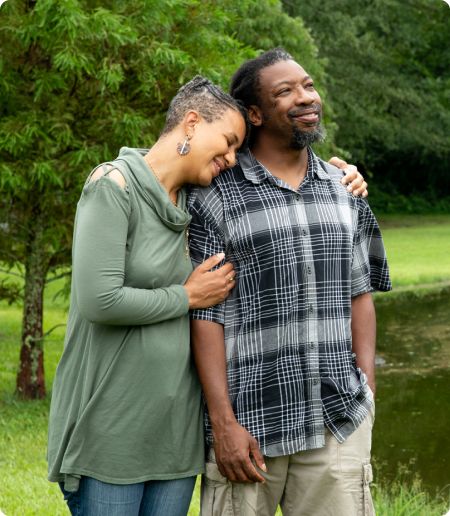Sometimes life gets tough.
Here are some easy ways to help feel a little better right in the moment. The tips below can provide some relief for you or someone you love.
- Watch funny videos. Research shows humor is great at calming anxiety.
- Try 4-5-6 breathing. It calms your nervous system. Breathe in for 4 counts, hold for 5 counts, exhale for 6 counts. Repeat.
- Build a playlist. Find songs that calm you and save them to listen to anytime you need them.
- Practice meditation. Try humming, listening to nature sounds, or stretching your body as you clear your mind.
- Set a reminder to connect. Pick a day each week to share something you like — a video, some music, or even a joke – with someone you think will like it too.
- Find people who like the things you do. You can try connecting with social support groups online and in-person.
- Volunteer. Helping others can shift your focus and help create a sense of purpose.
- Challenge negative thoughts. Ask yourself what facts prove the thought true and what facts prove it false. This can stop a negative spiral and balance your thinking.
- Get moving. Physical activity is a known mood booster, whether that’s a 10-minute walk, dancing, yoga, or hitting the gym. Find something you enjoy doing.
- Pick a go-to mood booster. Find one easy thing that lifts your spirits, like listening to music, drawing, or thinking about something you are grateful for.
- Break tasks into chunks. Tackle just one thing at a time to get small wins.
- Take a break. Give yourself permission to step away from a situation to reset. You’ll be better focused when you return.
- Focus on the present. Don’t worry about the future or dwell on the past — what can you do right now?
- Step away. When anger’s rising, step away and try one of the exercises below to calm down.
- Try 4-5-6 breathing. It calms your nervous system. Breathe in for 4 counts, hold for 5 counts, exhale for 6 counts. Repeat.
- Relax your body. Sit comfortably, and slowly tense and then release the muscles in your body one at a time. Start at your head and move slowly through each muscle down to your toes.
- Talk about it with someone. Talking with friends or family can help you process what happened and remember your loved one, helping you heal.
- Write a note to your loved one. Say what you’d want to tell them if they were here.
- Do something they loved doing. Pick an activity your loved one enjoyed doing. This can help you feel closer to them.
- Lead with empathy. Speak calmly, with warmth and caring. Use “I” statements and ask questions to clarify. Say things like:
- “I haven’t seen you smile much lately. Is something going on?”
- “I’m worried because you seem more anxious than usual. Is everything OK?”
- Actively listen. Let them talk without jumping in to “fix” things or offer solutions. Give cues that you’re listening like nodding and saying nonjudgmental things like:
- “I hear you.”
- “I’m sorry you’re going through that.”
- “That must be frustrating.”
- Keep questions open-ended. Encourage them to elaborate and provide more context. Ask things like:
- “Can you tell me more about what happened?”
- “What are you having trouble with?”
- Suggest activities. Offer to do something with them that you think they would enjoy.
- Choose something that will provide time to connect, like going for a walk or on a picnic.
- Do the organizing and planning for them so they can just show up.
- Keep your discussions confidential. Avoid sharing what they tell you with other family members or friends unless they say it’s OK. If you want to ask permission to share, say things like:
- “I think [Name] might have some helpful insights. Are you OK if I discuss it with them or would you prefer to keep it private?”
- Put them at ease. Let them know Louisiana 988 helpline specialists welcome calls or texts for problems big or small. It’s a confidential place to open up if they want to talk privately.
Part of being there for your loved one means making sure they’re safe. If you think someone might be in immediate danger, call 911 right away.


